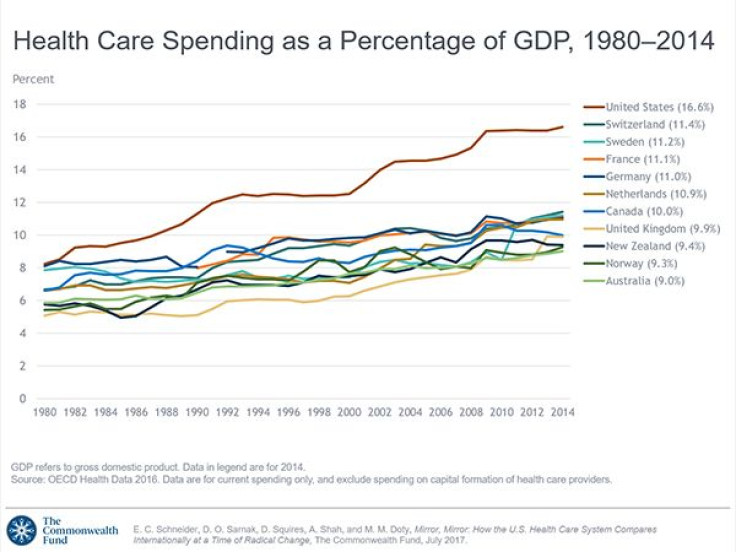What Are The Best Countries For Health Care? U.S. Last Among Wealthy Nations

The United States finished dead last in an analysis of health care quality across several wealthy nations, ranked either the worst or close to worst in categories like affordability, administrative efficiency and the health of the overall population.
A report from The Commonwealth Fund, a private, American-based foundation focused on health care issues, compared the country to seven others in Europe — France, Germany, the Netherlands, Norway, Sweden, Switzerland and the United Kingdom — as well as to Canada, Australia and New Zealand. Those other 10 were found to spend significantly less on care while enjoying better health, after the foundation inspected 72 “indicators” throughout the health care systems of each nation, which included gathering data from patient and doctor surveys as well as from the World Health Organization and other agencies.
Read: Artificial Heart Pumps Blood Like a Real Organ
“Based on a broad range of indicators, the U.S. health system is an outlier, spending far more but falling short of the performance achieved by other high-income countries,” the report said. “The results suggest the U.S. health care system should look at other countries’ approaches if it wants to achieve an affordable high-performing health care system that serves all Americans.”
The indicators were organized into five categories — care process, access, administrative efficiency, equity and health care outcomes — in which the countries were then ranked. In three of those categories the U.S. finished last, while finishing second to last, ahead of France, in administrative efficiency.
The one category in which the U.S. did better was care process, where it jumped to the fifth-place slot. That was a measure of preventive care, like speaking with a doctor about a healthy diet and getting a flu vaccine or a mammogram; safe care, which included a look at lab or medication mistakes; coordinated care, which analyzed how doctors and other providers shared information and worked together; and engagement and patient preferences, such as how doctors worked one-on-one with their charges.

“The U.S. tends to excel on measures that involve the doctor–patient relationship, performing relatively better on wellness counseling related to healthy behaviors, shared decision-making with primary care and specialist providers, chronic disease management, and end-of-life discussions,” the report said. “The U.S. also performs above the 11-country average on preventive measures like mammography screening and older adult influenza immunization rates. However, the U.S. performs poorly on several coordination measures, including information flows between primary care providers and specialist and social service providers. The U.S. also lags other countries on avoidable hospital admissions.”
Read: The Genetic Link Between Heart Disease and Fertility
So if you’re going to get sick, in which of these countries would you want to do it?
“No country ranks first consistently across all domains or measures, suggesting that all countries have room to improve,” the report said.
But of course some ranked better than others. The U.K. was awarded a first-place ranking overall, after scoring first or third in all of the categories except health care outcomes, a measure of things like infant mortality, life expectancy and disease survival rates. In that field, the only nation in the report that performed worse was the U.S., while Australia took the top spot.
Following the U.K. in the overall ranking was Australia, then the Netherlands. New Zealand and Norway were tied for the next slot, followed by a tie between Sweden and Switzerland. Bringing up the rear were Germany, Canada, France and finally the U.S.
© Copyright IBTimes 2024. All rights reserved.











